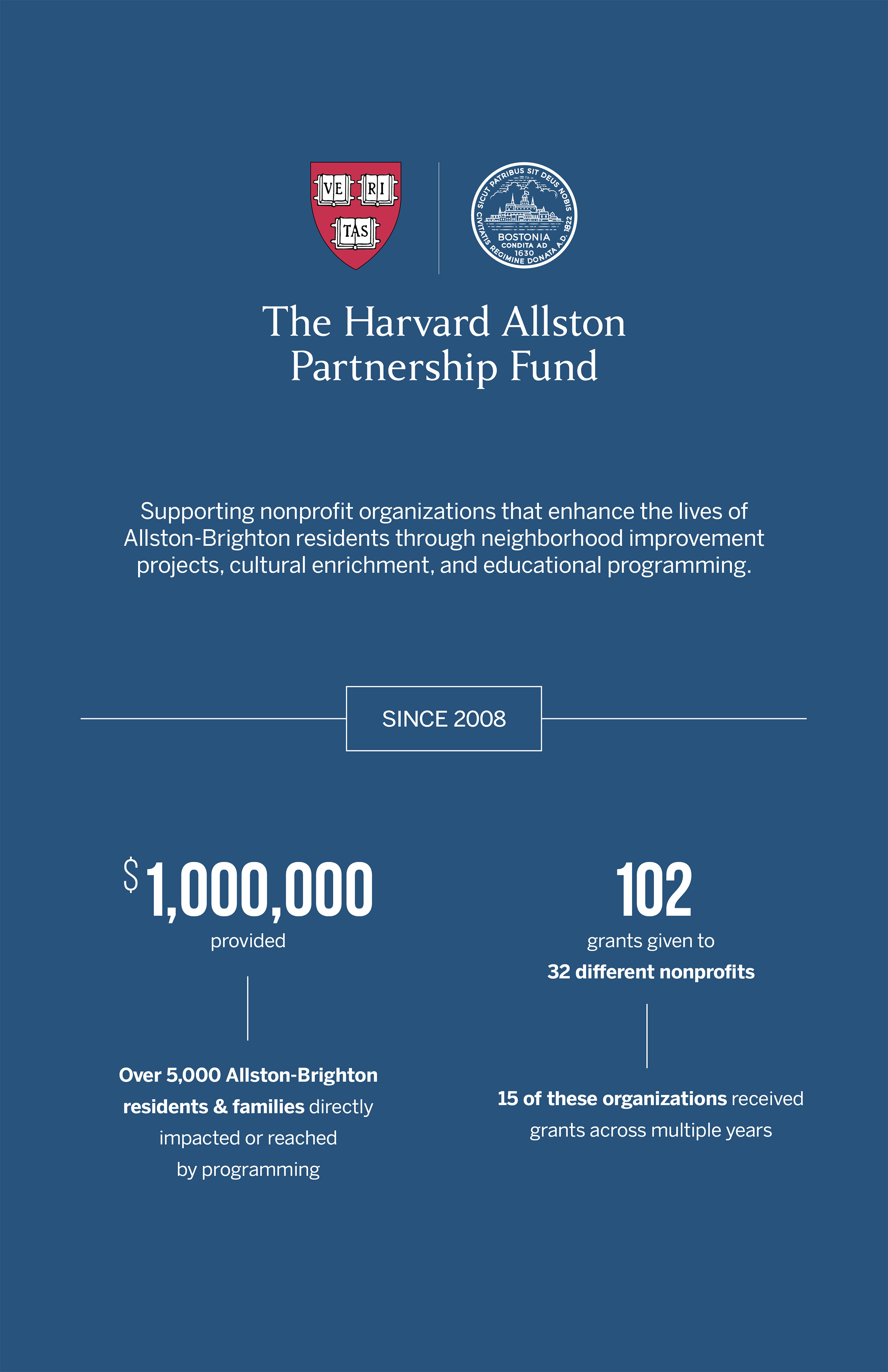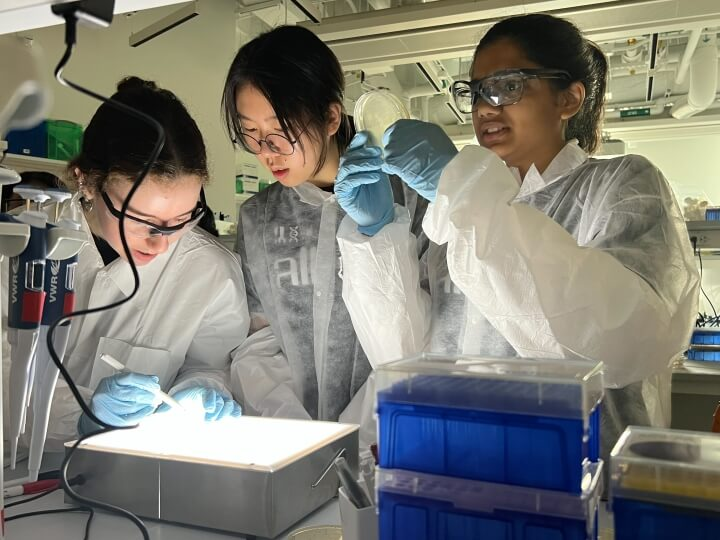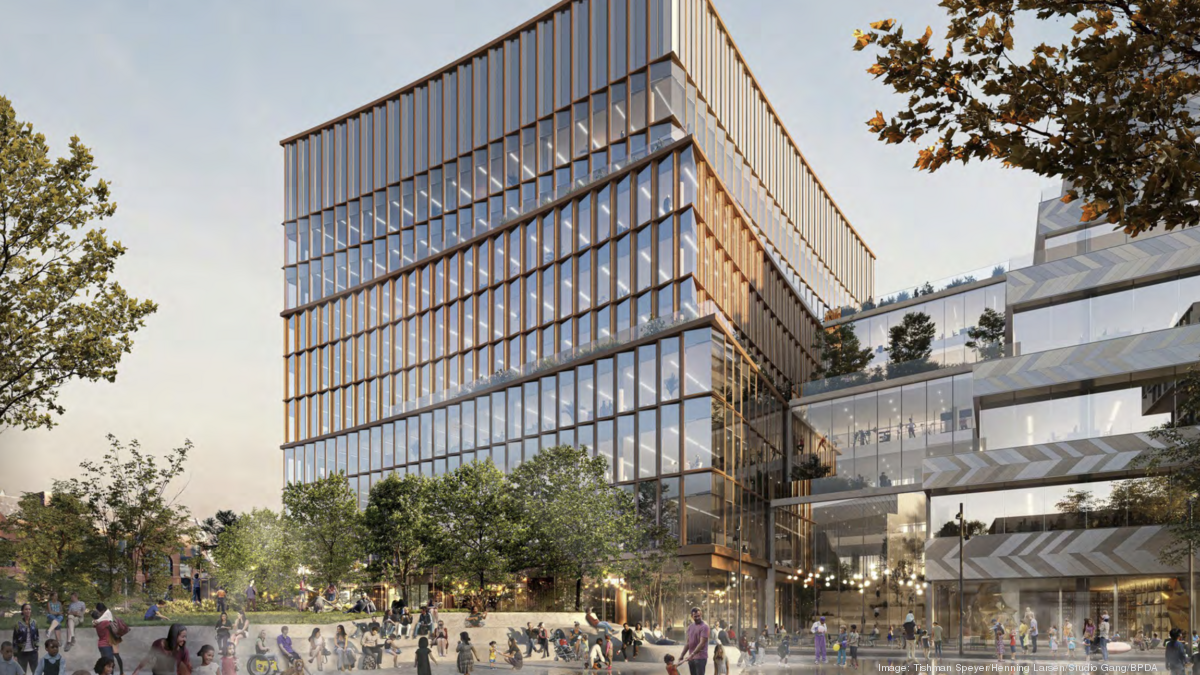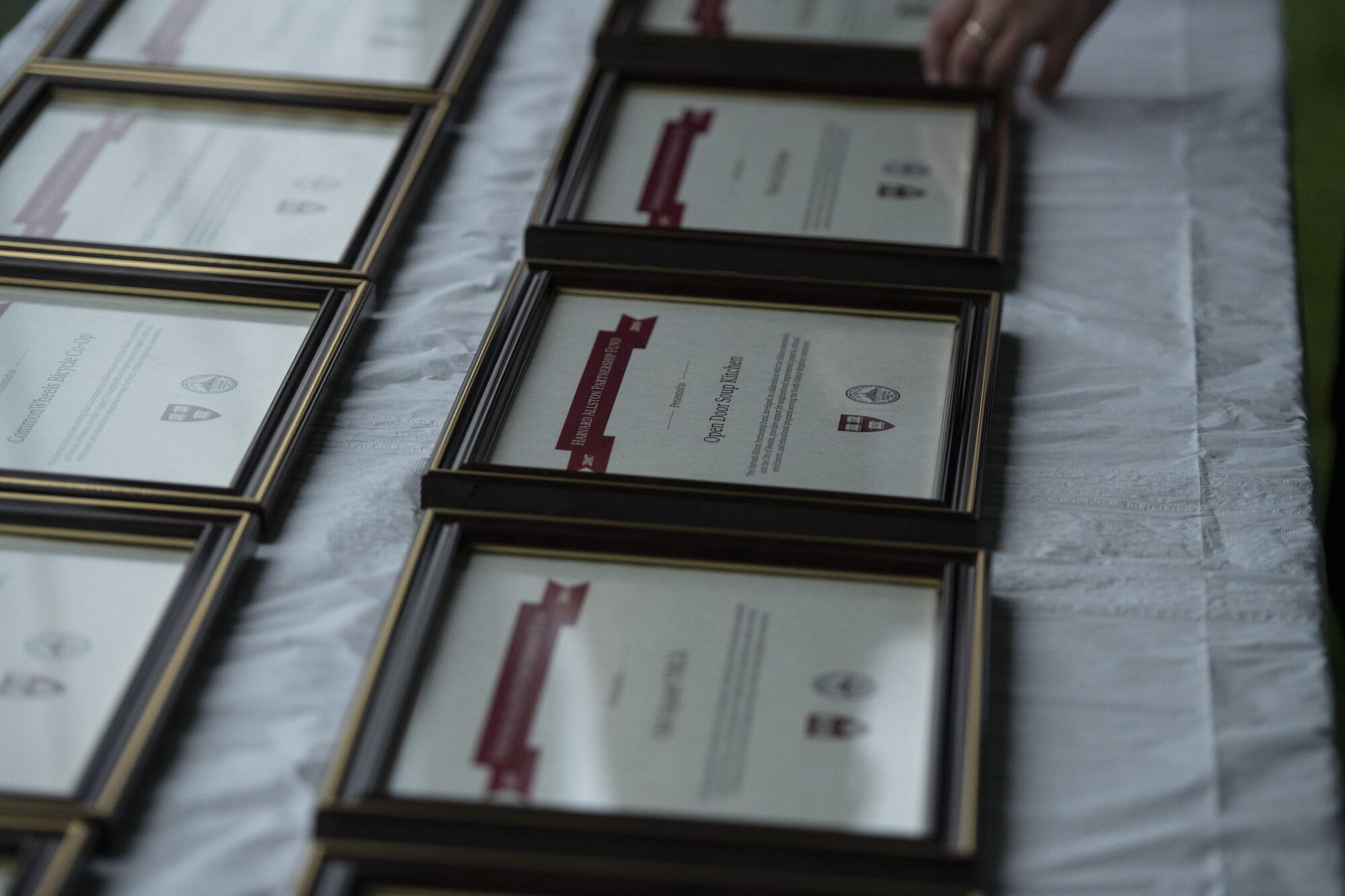
The Harvard Allston Partnership Fund (HAPF) stands out as a beacon of support for the Allston-Brighton community, committing significant resources to local nonprofits through its grants program. In a recent ceremony, HAPF awarded $200,000 to 26 Boston nonprofits, enhancing community development and providing crucial funding for various initiatives. The event, hosted at the Harvard Ed Portal, was an extraordinary gathering of local leaders, including state representatives and educational dignitaries, who celebrated this impactful community support. Through ongoing efforts, the Harvard Allston Partnership Fund has distributed a remarkable $1.8 million since its inception, demonstrating its dedication to fostering a vibrant nonprofit sector in the area. The initiative not only highlights the importance of collaboration between Harvard University and Allston but also emphasizes the transformative effects of Boston nonprofits grants for those in need.
As a vital component of Allston-Brighton’s community ecosystem, the Harvard Allston Partnership Fund plays a pivotal role in empowering local organizations through generous financial support. Launched in partnership with the Boston Planning and Development Agency, this initiative reflects a long-standing commitment to uplift the Allston-Brighton area by providing community support awards to a range of nonprofits. The recent grants awarded were celebrated at a prestigious event, showcasing the collaborative spirit and partnership between Harvard and local leaders. Beyond mere funding, the HAPF represents an active engagement in the community, addressing pressing social issues while promoting educational opportunities such as the Joseph M. Smith Scholarship. By investing in these grassroots initiatives, the fund’s impact extends far beyond the dollar amount, enhancing the overall quality of life for residents and fostering a dynamic community spirit.
Celebrating Community Impact through Grants
The Harvard Allston Partnership Fund (HAPF) has made significant strides in enhancing the Allston-Brighton community through its annual grant distribution, most recently awarding $200,000 to 26 local nonprofits. These grants exemplify the dedication of grassroots organizations to address vital community needs, providing not only financial support but also fostering collaboration and innovation. Events such as the awards ceremony held at the Harvard Ed Portal serve as a powerful reminder of the collective impact of these initiatives, honoring the hard work and commitment of organizations striving to improve their neighborhoods.
Especially evident during this year’s Grand Awards Ceremony were the heartfelt acknowledgments of community leaders, including Harvard President Alan Garber and City Councilor Liz Breadon. Their remarks highlighted the lasting influence of these grants, which have cumulatively supported the local ecosystem with over $1.8 million since the fund’s inception. This commitment to community support awards reinforces the idea of an interconnected network where each nonprofit plays a vital role in the overall welfare of Allston-Brighton residents.
The Role of the Harvard Allston Partnership Fund in Local Development
Established as part of a cooperation agreement involving Harvard University and the Boston Planning & Development Agency, the HAPF continues to be a beacon of support for Allston-Brighton nonprofits. Each year, a dedicated volunteer board evaluates proposals from local organizations and allocates necessary funding to initiatives that resonate with community values and needs. Programs funded by these grants encompass a variety of sectors including youth enrichment programs, health initiatives, and educational scholarships, ensuring that the diverse population of Allston-Brighton is effectively served.
The ongoing collaboration between Harvard and local organizations exemplifies how urban development can lead to positive outcomes for residents. As articulated by Boston’s Chief of Planning Arthur Jemison, the fund represents a tangible commitment to harnessing development powers for community betterment. This synergy between a major institution like Harvard and grassroots efforts is essential for driving sustainable change and enriching the local landscape.
Honoring Scholarship Recipients: The Joseph M. Smith Scholarship Program
At the recent awards ceremony, special recognition was given to the recipients of the Joseph M. Smith Scholarship Program, showcasing Harvard’s commitment to nurturing young talent from the Allston-Brighton area. These four students were honored not only for their academic achievements but also for their potential to make significant contributions to their communities. Scholarships like these emphasize the importance of accessibility to higher education, especially in communities facing socioeconomic challenges.
The inclusion of students like Richard D. Flores and Khalid Abdulle in the ceremony represents a shared hope for the future, as these young individuals are recognized for their dedication and commitment to their education. The support from the Harvard community through such scholarships fosters a culture of aspiration and growth, paving the way for future leaders who are equipped to uplift and advocate for their neighborhoods.
Grassroots Organizations Making a Difference
Many of the recipients of the HAPF grants exemplify grassroots initiatives that directly address the unique challenges of the Allston-Brighton community. For instance, organizations like Road to the Right Track and the Brazilian Women’s Group focus on vital issues such as youth education and mental health advocacy. These nonprofits are not just recipients of funding; they are integral to the community’s fabric, tackling pressing concerns and providing resources that empower residents.
Their work reflects a broader commitment within all funded programs to cultivate a thriving community ecosystem. Whether it is through youth music instruction or domestic violence advocacy, each organization plays a crucial role in creating opportunities and fostering resilience among Allston-Brighton’s diverse populations. This makes it clear that the investment into local nonprofits is an investment into the future of the community itself.
The Importance of Community Engagement in Nonprofit Funding
Effective nonprofit funding is deeply rooted in community engagement, which is evident in the operation of the Harvard Allston Partnership Fund. The selection process for grant recipients emphasizes collaboration and input from local community members, ensuring that the funds are allocated to projects that truly resonate with residents. Such participatory funding models help to create a sense of ownership and accountability among nonprofits while also enhancing the trust between them and the communities they serve.
By actively involving community members in the decision-making process, HAPF not only bolsters the quality of projects supported but also strengthens the overall impact of these initiatives. Engaged communities are better positioned to identify their needs and advocate for the resources necessary to meet them, a principle fundamental to the success of nonprofits in Allston-Brighton. This community-centric approach showcases how collaboration can lead to sustainable and meaningful change.
Spotlight on Award Recipients: Their Contributions to Allston-Brighton
During the awards ceremony, the achievements and contributions of various grant recipients were highlighted, underscoring the significant role of these organizations within Allston-Brighton. For instance, the Boston String Academy, awarded funding for enhancing music instruction, plays a vital part in enriching the cultural landscape of the area. Such programs not only provide essential skills to youth but also foster creative outlets and community cohesion.
Equally important is the work of advocacy groups like the Brazilian Women’s Group, which address critical social issues affecting vulnerable populations. Their dedication to mental health awareness and domestic abuse prevention reflects a proactive approach to community wellness. The recognition of these organizations during the HAPF awards ceremony serves to inspire continued support and involvement from both local residents and broader networks.
Ongoing Support for Innovative Programs
The grants provided by the Harvard Allston Partnership Fund serve as a catalyst for innovative programming across Allston-Brighton, with a clear focus on addressing the evolving needs of the community. By funding initiatives that explore new approaches to education, health, and social services, the fund demonstrates a commitment to adapting to significance changes and challenges within the area. Programs that receive grants often get the opportunity to pilot new ideas that can lead to scalable solutions for lasting impact.
This ongoing support not only equips local organizations with the resources they need but also fosters an environment of experimentation and growth. As nonprofits collaborate and share insights, they contribute to a dynamic ecosystem that prioritizes sustainability and responsiveness to local needs. The impact of this approach is evidenced by the numerous successful initiatives that have emerged as a result of the HAPF’s investment in community innovation.
The Future of the Harvard Allston Partnership Fund
As the Harvard Allston Partnership Fund looks to the future, its focus on creating meaningful change within the Allston-Brighton community continues to be paramount. The future endeavors of the fund aim to further enhance community engagement, outreach, and support, ensuring that the needs of the residents are not just met but acknowledged as critical to the ongoing vitality of the area. Plans for upcoming events and initiatives will likely build on the successes of previous years, reinforcing Harvard’s commitment to fostering goodwill and collaboration within the local community.
The potential for expanding the reach of the HAPF is promising, with stakeholders looking at innovative funding models and partnerships that can enhance their influence. By staying connected with community leaders and organizations, the fund is positioned to adapt to the changing landscape and emerging needs of Allston-Brighton, ensuring that the legacy of support continues to thrive.
Recognizing Community Leaders and Volunteers
Acknowledging the leaders and volunteers involved in the HAPF reflects an appreciation for the communal effort behind the success of funded projects. The dedication of individuals like City Councilor Liz Breadon and other advisory board members is crucial, as they lend their expertise and passion to evaluate grant applications and guide the fund’s direction. Their collective experience ensures that the voices of Allston-Brighton residents are heard and prioritized in funding decisions.
The recent ceremony also focused on honoring retiring members of the Harvard Allston Task Force, who have contributed invaluable services over their years of commitment. Such recognitions bring to light the impact that engaged community leadership has on the local landscape, fostering an enduring spirit of service and collaboration. Celebrating these contributions not only strengthens community ties but also encourages the next generation to continue this legacy of involvement.
Frequently Asked Questions
What is the Harvard Allston Partnership Fund and how does it support Boston nonprofits?
The Harvard Allston Partnership Fund is a collaborative initiative between Harvard University and the Boston Planning and Development Agency aimed at supporting Boston nonprofits through community support awards. Established in 2008, the fund has awarded $1.8 million in grants to enhance the Allston-Brighton community through various grassroots programs.
How can organizations apply for grants from the Harvard Allston Partnership Fund?
Organizations seeking funding from the Harvard Allston Partnership Fund can submit grant applications evaluated by a volunteer board of community members. Each year, the fund allocates grants to local Allston-Brighton nonprofits that address community needs through innovative projects and initiatives.
What types of projects are funded by the Harvard Allston Partnership Fund?
The Harvard Allston Partnership Fund finances a diverse range of projects including educational scholarships, youth enrichment programs, and public health initiatives. By focusing on community impact, the fund supports programs that foster positive development in the Allston-Brighton area.
Who are the recent recipients of the Harvard Allston Partnership Fund grants?
In April 2024, the Harvard Allston Partnership Fund awarded $200,000 in grants to 26 Allston-Brighton nonprofits. Notable recipients included Road to the Right Track, Boston String Academy, and the Brazilian Women’s Group, all of which provide crucial services such as educational funding, music instruction, and mental health advocacy.
What is the Joseph M. Smith Scholarship and its connection to the Harvard Allston Partnership Fund?
The Joseph M. Smith Scholarship is a program that honors Harvard College students from the Allston-Brighton area who have demonstrated academic excellence and community involvement. This scholarship is celebrated at events hosted by the Harvard Allston Partnership Fund, showcasing the partnership’s commitment to supporting local educational opportunities.
How does the Harvard Allston Partnership Fund impact the Allston-Brighton community?
The Harvard Allston Partnership Fund positively impacts the Allston-Brighton community by providing financial support to local nonprofits that address vital community issues. The fund has enabled various initiatives that enhance educational opportunities, promote health and wellness, and foster community engagement, ultimately improving the quality of life for residents.
What role does the Harvard Ed Portal play in events related to the Harvard Allston Partnership Fund?
The Harvard Ed Portal serves as a venue for events like the Harvard Allston Partnership Fund Grand Awards Ceremony, where community leaders and grant recipients gather to celebrate the contributions of local nonprofits. This space fosters collaboration and connection between Harvard University and the Allston-Brighton community.
How can the community stay updated on Harvard Allston Partnership Fund events and initiatives?
The community can stay informed about events and initiatives related to the Harvard Allston Partnership Fund by following the Harvard Ed Portal’s announcements and the official Harvard Allston website, which provide updates on funding opportunities, grant recipient stories, and upcoming events.
| Speaker/Organizer | Role/Title | Key Points |
|---|---|---|
| Liz Breadon | Boston City Councilor, District 9 | Gave remarks and recognized retiring task force members for their service. |
| Paul Andrew | Vice President for Public Affairs & Communications, Harvard University | Acknowledged grant recipients and the positive impact of the funds. |
| Alan Garber | Interim President, Harvard University | Expressed gratitude towards grant recipients and the advisory board. |
| Arthur Jemison | Chief of Planning, Boston Planning and Development Agency | Highlighted the community benefits from the grant-funded programs. |
| Frank Hughes | Head Coach and Founder, Road to the Right Track | Requested appreciation for the financial support that aids local youth. |
Summary
The Harvard Allston Partnership Fund plays a significant role in enhancing the community by awarding grants to local nonprofits that support various initiatives. At the recent Grand Awards Ceremony, key stakeholders including Liz Breadon, Alan Garber, and Arthur Jemison emphasized the importance of community engagement and the positive outcomes of funding for grassroots organizations. These efforts reflect Harvard Allston Partnership Fund’s commitment to nurturing a collaborative ecosystem within Allston-Brighton, truly empowering residents through supportive programs and initiatives.







